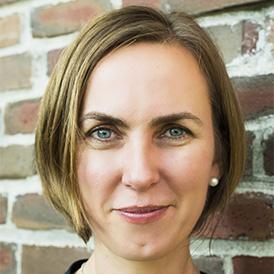Resident Scholar Program
About the Program | Current Scholars | Scholar Emeriti | Bill and Betsy Leitch
Upcoming Events | Past Events
Upcoming Events | Past Events
Shannon Hughes, PhD
Instructor and Research Scientist (MIT)

Phone: (617) 258-9488
Office: 56-378
Courses: 20.109
Research areas:
- Systems Biology
Research Focus
Aberrant cell migration is a hallmark of several invasive diseases, such as metastatic cancer and systemic autoimmune disorders. I am particularly interested in the regulation of cell motility and the underlying intracellular signaling processes as modulated by interaction with the cytoskeleton. My current research combines biochemical, cell biological and systems biological engineering approaches to elucidate the intracellular signaling mechanism underlying increased breast cancer metastasis due to expression of an invasion-specific protein, MenaINV.
Teaching Goals
Hands-on experience at the bench is useful for all engineers, experimentalists and theoreticians alike. In biological engineering, understanding how to experimentally perturb cell-based systems in a systematic and controlled manner is paramount to applying an engineering perspective across disciplines. My aim as an instructor of 20.109 is to provide practical, interesting, and motivating experiences that promote rewarding Aha! moments and drive novel insight and innovation. I believe that mentoring at the personal level, as well as the instructional level, is key to preparing the next generation of bioengineers for their careers tackling global technical health challenges. As such, I strive to provide opportunities for all students to improve and succeed in performing and communicating their science.Katharina Ribbeck, PhD
Eugene Bell Career Development Professor of Tissue Engineering (MIT)

Phone: (617) 715-4575
Office: 56-341C
Lab Website: kr-lab.mit.edu
Courses: 20.363J, 20.380, 20.463J
Research areas:
- Biomaterials
- Biophysics
- Microbial Pathogenesis
- Microbial Systems
- Transport Phenomena
Biography
Prof. Ribbeck obtained her Bachelor’s degree and her PhD in Biology from the University of Heidelberg, Germany. She continued her postdoctoral research at the European Molecular Biology Laboratory, Heidelberg, Germany, and the Department of Systems Biology, Harvard Medical School. Katharina Ribbeck established her independent research group as a Bauer Fellow at the FAS Center for Systems Biology, Harvard University in 2007, and joined the Department of Biological Engineering at MIT as an Assistant Professor in 2010.
Research
The Laboratory for Biological Hydrogels’ focus is on basic mechanisms by which mucus barriers exclude, or allow passage of different molecules and pathogens, and the mechanisms pathogens have evolved to penetrate mucus barriers. It hopes to provide the foundation for a theoretical framework that captures general principles governing selectivity in mucus, and likely other biological hydrogels such as the extracellular matrix, and bacterial biofilms. The Lab’s work may also be the basis for the reconstitution of synthetic gels that mimic the basic selective properties of biological gels.Nelly Rosario
Novelist, Senior Lecturer (Texas State University)

Biography
Nelly Rosario is a visiting scholar in Comparative Medis Studies at MIT and is the author of Song of the Water Saints: A Novel, winner of a 2002 PEN/Open Book Award. She earned an Master of Fine Arts from Columbia University and a Bachelor of Science in Environmental Engineering from MIT. Honors include the Sherwood Anderson Award in Fiction, NALAC Artist Grants, National Arts Club Writing Fellowships, and a Hurston/Wright Award in Fiction. Her fiction, nonfiction, and poetry appear in various anthologies and publications, including Callaloo, Review, Meridians, The New York Times, and el diario/La Prensa, where her bi-weekly column has run since 2008. Rosario is an assistant professor in the MFA Program at Texas State University- San Marcos.
Currently Rosario is preparing for her next novel, which concentrates on medicine and anatomy, by visiting MIT libraries, interviewing people, and sitting in on lectures. She notices changes since her own student days including many more women students and faculty and a greater focus on digital thinking, multimedia, new ways of telling stories. Rosario also serves part-time as writer and researcher for the ongoing Blacks at MIT History Project directed by Clarence Williams, MIT adjunct professor of urban studies, emeritus. “We’re looking at how blacks influenced the Institute and vice versa, collecting oral histories, photographs and data, and analyzing the material within a larger framework and context. We’re thinking about a way to look at history to unfold the future, what that means for the Institute, and how diversity and excellence can work in tandem.”
Robert Randolph
Chaplain to the Institute (MIT)

Biography
In the Fall of 2007, Dr. Robert M. Randolph became MIT’s first Chaplain to the Institute. An ordained minister, he is responsible for the chaplaincy program at MIT and teaches a class each year dealing with the Abrahamic Faiths: Judaism, Christianity and Islam. He serves on the Board of Ministry at Harvard University and is a member of the Clergy Chapter of the Memorial Church on the Harvard Campus. Dr. Randolph came to MIT in 1979 as the Assistant Dean for Student Affairs. He served as Dean in Residence from 1982 until 1986, and in 1993, he became the Senior Associate Dean for Undergraduate Education and Student Affairs. In 1994-1995, he helped bring to culmination, a process that created a Religious Activities Center which is home, along with the Chapel built in 1956, for the religious traditions represented on the MIT campus. In recognition of his contribution to the Institute in 1996, he received the Gordon Y. Billard Award for Exemplary Service to MIT. Dr. Randolph is currently the Housemaster of Bexley Hall. He also serves on the Board of Ministry of Harvard University, is a Trustee of the Stephen Phillips Memorial Charitable Trust Scholarship Fund, and serves on the board of the Rockport Chamber Music Festival.
According the Bob, "The biggest challenge with regard to religious life at MIT is simply keeping people talking to each other, so that the stereotypes that operate, and have operated for far too long out there, are not allowed to reimpose themselves."

